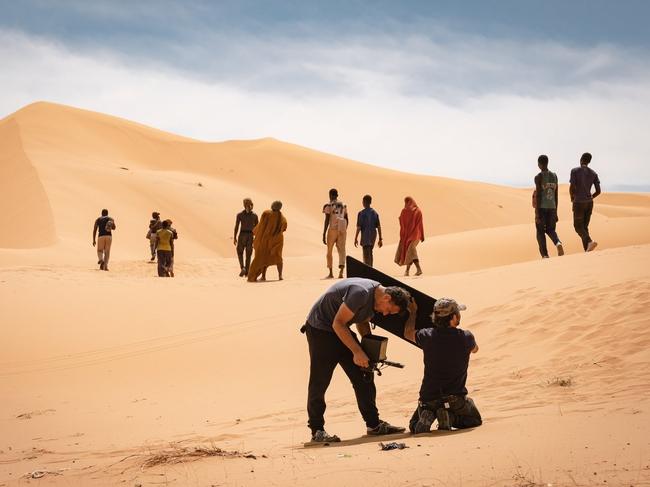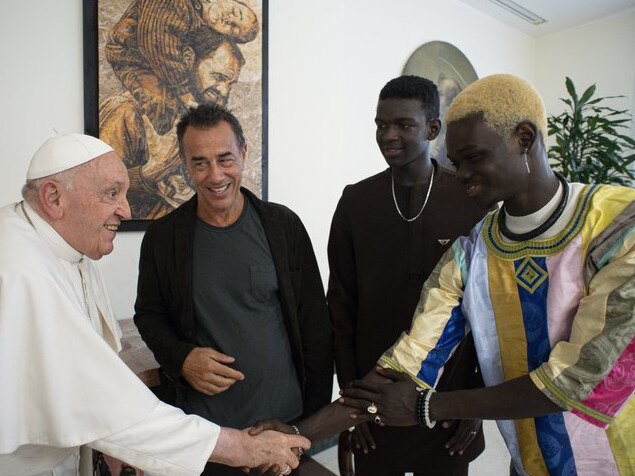Io Capitano (Me Captain) to screen at Europa Europa film festival in Sydney and Melbourne
An Italian film based on real-life immigrant stories – and made with untrained African actors – captures the essence of what it means to dream.

When Matteo Garrone’s Io Capitano (Me Captain) made the short list for the Oscars’ international category last week, the famed director of Gomorrah was as surprised as anyone that his tough but elegant immigrant odyssey made the cut.
“This is a great honour and we are so grateful and happy that the adventure of Io Capitano continues,” he says. “Our hope is that the film, and the story of Seydou that shows us a journey through the eyes of a young person dreaming of a better life, will continue to reach audiences all over the world.”
It is the first Oscar nomination for Garrone, 55, who has previously taken out Jury prizes in Cannes for Gomorrah (2008) and Reality (2012). At the Venice Film Festival last year he won best director for Me Captain, while his remarkable untrained Senegalese lead actor, Seydou Sarr, won for best newcomer.
“It gave me pleasure to make the film and to exactly depict the immigrants and what really happens in the desert and on the sea,” Sarr said after his Venice win.
Garrone painstakingly prepared his vast widescreen (and clearly expensive) epic over many years and based the story on real-life accounts of Africans who made the hazardous journey across land and sea to Europe. He shot the scenes in chronological order with the actual people beside him.
The film follows the always positive and bright-eyed Seydou and his cousin Moussa (Moustapha Fall) as they plan to travel to Europe from their not unhappy lives in Dakar to pursue a career in music.
Their voyage involves false passports, fixers and bribes, and they are taken advantage of all along the way. The scenes as they walk through the Sahara Desert are breathtaking, the Libyan detention centre where Seydou is tortured is grotesque, and their trip across the Mediterranean to Sicily – when the inexperienced sailor Seydou has to captain the boat – is astounding. It will have audiences on the edge of their seats: will they make it, or won’t they?
“I thought it was important to show a part of the journey that we usually don’t see,” Garrone explains in Venice.
“We’ve heard about the desert and the Libyan prisons, but we haven’t lived this with a character. We know more about the boats arriving on the Mediterranean and large numbers of people dying. So what we wanted to do is to change the point of view and follow them in this part of the journey and to tell of this violence.
“It was also important to show how Seydou is pure – it’s as if you see the violence reflected in his eyes. I didn’t show too much of the violence, but I left the camera on Seydou’s eyes like a mirror which can be even stronger.”
The film is essentially a coming-of-age story for the 17-year-old Seydou character. Incredibly, Fofana Amara, the real boy who captained the boat eight years ago with 250 people on board, was only 15 at the time.

“When Fofana told me his story, I was really moved, because he was only 15 and had never driven a boat,” Garrone recalls. “Of course, he tried to change his mind, but it was too late, like in the movie. Every part of the movie is connected to something that is true.”
Amara, who is Guinean, currently lives in Liege, Belgium and was unable to travel to Venice for the film’s premiere.
“He’s working in a supermarket and he doesn’t have papers, but he probably will have them soon,” Garrone says.
Garrone’s other main consultant, Mamadou Kouassi, who had travelled on foot from Cote D’Ivoire across the desert 18 years ago, accompanied Garrone and Amara at a special screening of the Italian-Belgian co-production for the European parliament last November. Perhaps even more impressive is that the director and his cast met Pope Francis and watched the film with him.
Garrone has also been speaking at schools about human rights and discussing the injustices faced by black and brown youngsters who share the same desire as young Europeans to see the world.
“There’s another kind of migration, which is strictly connected to the fact that 70 per cent of the African population is young,” says Garrone. “A travel visa for young Africans is the only way to put an end to the illegal trafficking of human beings. The number of young people entitled to travel and work in Europe should be increased and it should not only depend on their bank accounts.”

Me Captain did well at the Italian box office, which is an achievement for a film about social issues and with no stars. Sting and Isabella Rossellini attended an early screening at New York’s Museum of Modern Art and now, ahead of the film’s US release and indeed before the Oscars, Garrone can be seen on iocapitano.com in an interview with Roberto Benigni, the star of his 2019 film Pinocchio, and winner of the best actor Oscar in 1999 for Life is Beautiful.
Benigni says Me Captain “is both strong and fragile, a great Italian film along the lines of Rossellini and De Sica”, and that it’s also international. “Inside there’s John Ford because it’s epic,” he says.
Addressing Sarr, sitting alongside Garrone, he says: “In your eyes there’s mystery, suffering, hope, adventure and tragedy.”
Garrone compares Me Captain to his earlier film, Pinocchio, noting “how dangerous it can be to do things against your parents’ wishes, because the violence of the world around us is very strong.
“It’s a coming-of-age story, a bit like Pinocchio. Pinocchio disobeys his father and runs away and Seydou does the same with his mother and cousin. They look for the land of toys and they find the violence of the world that is around them. So there are elements of Pinocchio but also elements of Gomorrah in the harshness of the experience that the boys have.”
Given his penchant for visual flourish, Garrone added two dream sequences to Me Captain, in part to break the intensity.
“I wanted to emphasise Seydou’s coming maturity as he searches inside his soul and experiences a sense of guilt that he has abandoned a woman in the desert and betrayed his mother.”

Me Captain was shot across 13 weeks in Senegal, Italy and Morocco with a cast of non-professional actors.
“It was something completely new for me, to enter into a culture that is not mine or to work in a language that I don’t understand,” Garrone says.
“It took me many years to decide how to make this movie because I was afraid. For a long time I felt like an intruder and felt like I was not up to dealing with a subject that belonged to another culture and it was such a delicate issue. I was afraid to be speculating, to have the attitude of the European bourgeois on tackling the migrants who cross Africa. In the end it was a film that chose me and dropped me into this world.”
There’s no doubting that Garrone loves telling dark stories and fantasies. The Roman son of a theatre critic and a photographer, he made his mark with his searing account of the mafia around Naples, 2008’s Gomorrah, which drew on the real-life experiences of boys lured into becoming mafia foot soldiers. It was loosely based on Roberto Saviano’s expose, which also spawned a groundbreaking series (available on SBS) and led to the star writer living largely under protection.
Garrone has made only one English-language movie, 2015’s Tale of Tales, which premiered in Cannes and remains his wildest fantasy venture to date. In fact, a stunning blood-drenched image of Salma Hayek’s 17th-century Italian queen munching on a sea dragon’s heart – cooked by a virgin in order that the queen may conceive a child – went viral. (I spoke to Hayek for the film and she recalled the gooey concoction that looked like blood and guts, even if in reality it was more akin to red-sauced pasta.)
As newcomers, Sarr and Fall were hugely protected by Garrone as they were affected by their portrayal of the real-life immigrant stories.
“When the characters cried, they cried,” Garrone says. “They felt bad because they arrived without any technique, but they were living something, feeling something inside. So it was a very important experience for me.”
While the youngsters both say that they would never have made the journey from Dakar knowing how risky it is, they are clearly on their way to achieving the career of their dreams.
Io Capitano (Me Captain) screens as part of the Europa Europa film festival in Sydney and Melbourne, February 15-March 11. General cinema release from March 28.

To join the conversation, please log in. Don't have an account? Register
Join the conversation, you are commenting as Logout